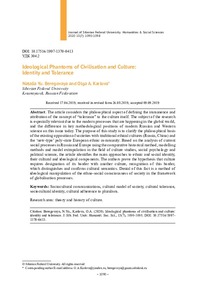Показать сокращенную информацию
Ideological Phantoms of Civilisation and Culture: Identity and Tolerance
| Автор | Beregovaya, Natalia Yu. | en |
| Автор | Karlova, Olga A. | en |
| Автор | Береговая, Н. Ю. | ru_RU |
| Автор | Карлова, О. А. | ru_RU |
| Дата внесения | 2019-10-09T06:01:35Z | |
| Дата, когда ресурс стал доступен | 2019-10-09T06:01:35Z | |
| Дата публикации | 2019-10 | |
| URI (для ссылок/цитирований) | https://elib.sfu-kras.ru/handle/2311/126348 | |
| Аннотация | The article considers the philosophical aspect of defining the immanence and attribution of the concept of “tolerance” to the culture itself. The subject of the research is especially relevant due to the modern processes that are happening in the global world, and the difference in key methodological positions of modern Russian and Western science on this issue today. The purpose of this study is to clarify the philosophical basis of the existing opposition of societies with traditional ethical cultures (Russia, China) and the ‘new-type’ poly-state European ethnic community. Based on the analysis of current social processes in Russia and Europe using the comparative historical method, modelling methods and model extrapolation in the field of culture studies, social psychology and political science, the article identifies the main approaches to ethnic and social identity, their cultural and ideological components. The authors prove the hypothesis that culture requires designation of its border with another culture, recognition of this border, which distinguishes and confirms cultural semantics. Denial of this fact is a method of ideological manipulation of the ethno-social consciousness of society in the framework of globalisation processes | en |
| Аннотация | Статья посвящена философскому аспекту определения имманентности и атрибутивности понятия «толерантность» собственно культуре как таковой. Предмет исследования актуализирован как современными процессами в глобальном мире, так и различием ключевых методологических позиций в данной проблематике, на которых держатся сегодня современная российская и западная наука. Цель настоящего исследования — уточнение философских оснований существующего противопоставления обществ с традиционными этическими культурами (Россия, Китай) и полигосударственной европейской этнической общности «нового типа». На материале анализа происходящих в России и Европе общественных процессов с использованием сравнительно-исторического метода, методов моделирования и модельной экстраполяции в области культурологии, социальной психологии и политологии в статье выявляются основные подходы к этнической и социальной идентичности, культурные и идеологические их составляющие. Подтверждена гипотеза о том, что культура требует обозначения своей границы с другой культурой, признания этой границы, различающей и подтверждающей культурную семантику. Отрицание этого факта — прием идеологического манипулирования этносоциальным сознанием общества в рамках глобализационных процессов | ru_RU |
| Язык | en | en |
| Издатель | Сибирский федеральный университет. Siberian Federal University | en |
| Тема | sociocultural communications | en |
| Тема | cultural model of society | en |
| Тема | cultural tolerance | en |
| Тема | sociocultural identity | en |
| Тема | cultural adherence to pluralism | en |
| Тема | социокультурные коммуникации | ru_RU |
| Тема | культурная модель общества | ru_RU |
| Тема | культурная толерантность | ru_RU |
| Тема | социокультурная идентичность | ru_RU |
| Тема | идентификация | ru_RU |
| Тема | плюралистичность культуры | ru_RU |
| Название | Ideological Phantoms of Civilisation and Culture: Identity and Tolerance | en |
| Альтернативное название | Идеологические фантомы цивилизации и культура: идентичность и толерантность | ru_RU |
| Тип | Journal Article | en |
| Контакты автора | Beregovaya, Natalia Yu.: Siberian Federal University 79 Svobodny, Krasnoyarsk, 660041, Russia; beregovaya@guszn.admkrsk.ru | en |
| Контакты автора | Karlova, Olga A.: Siberian Federal University 79 Svobodny, Krasnoyarsk, 660041, Russia; O.A.Karlova@yandex.ru | en |
| Контакты автора | Береговая, Н. Ю.: Сибирский федеральный университет Россия, 660041, Красноярск, пр. Свободный, 79 | ru_RU |
| Контакты автора | Карлова, О. А.: Сибирский федеральный университет Россия, 660041, Красноярск, пр. Свободный, 79 | ru_RU |
| Страницы | 1090-1098 | |
| DOI | 10.17516/1997–1370–0533 | |
| Журнал | Журнал Сибирского федерального университета. Гуманитарные науки. Journal of Siberian Federal University. Humanities & Social Sciences; 2020 13 (7) | en |

